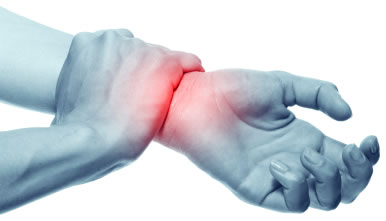Carpal Tunnel Syndrome
 Carpal tunnel syndrome is a progressively painful hand and arm condition caused by a pinched nerve in your wrist. A number of factors can contribute to carpal tunnel syndrome, including the anatomy of your wrist, certain underlying health problems and possibly patterns of hand use. Your New Orleans orthopaedic specialist will determine the cause and prescribe the best treatment!
Carpal tunnel syndrome is a progressively painful hand and arm condition caused by a pinched nerve in your wrist. A number of factors can contribute to carpal tunnel syndrome, including the anatomy of your wrist, certain underlying health problems and possibly patterns of hand use. Your New Orleans orthopaedic specialist will determine the cause and prescribe the best treatment!Symptoms of Carpal Tunnel Syndrome
Carpal tunnel syndrome typically starts gradually with a vague aching in your wrist that can extend to your hand or forearm. Common carpal tunnel syndrome symptoms include:
- Tingling or numbness in your fingers or hand, especially your thumb and index, middle or ring fingers, but not your little finger.
- Pain radiating or extending from your wrist up your arm to your shoulder or down into your palm or fingers, especially after forceful or repetitive use.
- A sense of weakness in your hands and a tendency to drop objects.
Tests and Diagnosis of Carpal Tunnel Syndrome
Your New Orleans orthopaedic surgeon may conduct one or more of the following tests to determine whether you have carpal tunnel syndrome:
- History of symptoms;
- Physical exam;
- X-ray;
- Electromyogram;
- Nerve conduction study.
The electromyogram and nerve conduction study tests are also useful in checking for other conditions that might mimic carpal tunnel syndrome, such as a pinched nerve in your neck.
Treatment Options for Carpal Tunnel Syndrome
Fortunately for most people who develop carpal tunnel syndrome, proper treatment by your orthopaedic specialist in New Orleans can usually relieve the pain and numbness and restore normal use of their wrists and hands. Some people with mild symptoms of carpal tunnel syndrome can ease their discomfort by taking more-frequent breaks to rest their hands and applying cold packs to reduce occasional swelling.
If these techniques don’t offer relief within a few weeks, additional treatment options include wrist splinting, medications and surgery. Splinting and other conservative treatments are more likely to help you if you’ve had only mild to moderate symptoms for less than 10 months.
If you have persistent signs and symptoms suggestive of carpal tunnel syndrome, especially if they interfere with your normal activities and sleep patterns, see your New Orleans orthopaedic specialist. If you leave the condition untreated, nerve and muscle damage can occur.
We want to be your trusted Orthopaedic Specialists of New Orleans. If you are experiencing the symptoms of Carpal Tunnel Syndrome, please call our office at (504) 897-7877 and a member of our caring staff will be happy to help you.
Thank you for trusting us with your care!
Request An Appointment